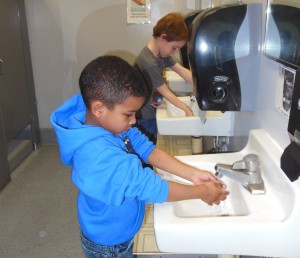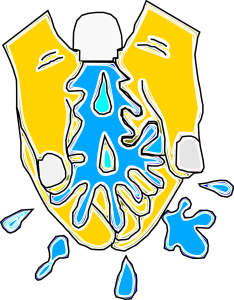The Importance of Hand Washing in Child Care
As a parent, one of the things you may find yourself worrying about a lot is the health of your child. You are often overwhelmed by the constant reports of illnesses and “bugs” going around and want to find ways to prevent your child from becoming sick. Having a sick child can be stressful and scary. Seeing them suffer and knowing that they feel bad can be heartbreaking. As we move into the flu season, it is important to remember the most effective preventative health measure of child care: hand washing.
The Science of Hand washing
The importance of hand washing in preventing the spread of illness cannot be overstated. According to research from the Center for Disease Control,
community hand washing education reduced the number of people who got a diarrheal illness by 31%. Hand washing education also reduced the number of diarrheal illnesses in people with weakened immune systems by 58%. Further, respiratory illness, including colds, were reduced by 16-21%.
The reason handwashing is so important in preventing the spread of illness is because your hands and the hands of your child can carry a lot of germs. Anytime you touch something there is a transfer of germs, especially if that object is frequently used by others, such as a doorknob. These germs can then enter the body from contact with the eyes, face and mouth.
While visible dirt on your little ones hands after a day of play is always a good sign that they need to wash their hands, even when their hands appear clean there can be bacteria lurking on them that can get them sick. Kids often tinker with dirty things and have a tendency to touch their eyes, nose and face more than adults. This increases the risk of germs getting your child sick. Children are also at a greater risk because their immune systems are not as fully developed as an adult’s. It is therefore very important that you teach your children when and how to wash their hands. Here are some tips to help make sure your child gets in the habit of hand-washing.
The When and How of Good Hand washing
When teaching your child to wash their hands, it is recommended that you do it with them. Take the time to show them how to do it and tell them about the importance of hand washing. How many times have your kids asked a “why” question? When you can show them the why and the how, your child will be more likely to make this a regular habit.
To make sure you scrub all those germs away, follow these tips:
- Wash your hands in warm water. You don’t want to make it too hot for your little ones hands!
- Use soap, preferably antibacterial, and lather for about 20 seconds. Teach your child to wash in between the fingers and under the nails. Those are the areas that bacteria like to hang out.
- Rinse and dry well using a clean towel.
You should teach your child to wash their hands before and after every meal, after using the potty, after blowing their nose or coughing, touching animals and playing outside.
The Importance of Hand washing in a Child Care Setting
When kids are brought together in a child care setting, such as preschool or daycare, the importance of hand washing is even greater. When playing and interacting, kids can share a lot of germs and the best way to prevent the bad germs from being spread around is to make sure that everyone washes their hands frequently.
At Noah Ark Child Center, we take the health and well-being of your child very seriously. When you leave you child in our care, we ensure that your child and the other children in their class regularly wash their hands before and after eating, using the bathroom or any other activity that might cause your child to come into contact with germs.
We look forward to providing a fun, safe and healthy environment for your child to learn! Contact Noah’s Ark Child Center today!


